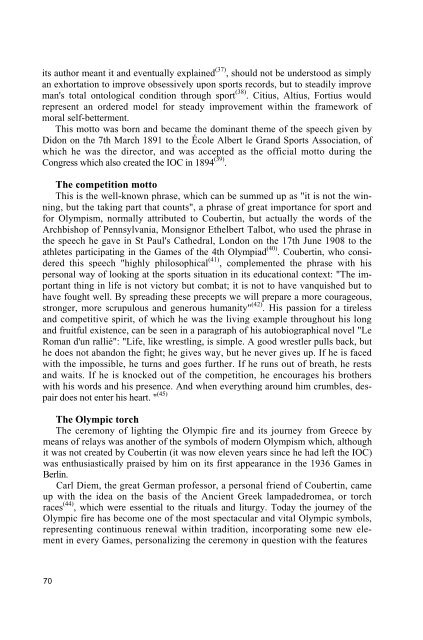Create successful ePaper yourself
Turn your PDF publications into a flip-book with our unique Google optimized e-Paper software.
its author meant it and eventually explained (37) , should not be understood as simply<br />
an exhortation to improve obsessively upon sports records, but to steadily improve<br />
man's total ontological condition through sport (38) . Citius, Altius, Fortius would<br />
represent an ordered model for steady improvement within the framework of<br />
moral self-betterment.<br />
This motto was born and became the dominant theme of the speech given by<br />
Didon on the 7th March 1891 to the École Albert le Grand Sports Association, of<br />
which he was the director, and was accepted as the official motto during the<br />
Congress which also created the IOC in 1894 (39) .<br />
The competition motto<br />
This is the well-known phrase, which can be summed up as "it is not the winning,<br />
but the taking part that counts", a phrase of great importance for sport and<br />
for Olympism, normally attributed to Coubertin, but actually the words of the<br />
Archbishop of Pennsylvania, Monsignor Ethelbert Talbot, who used the phrase in<br />
the speech he gave in St Paul's Cathedral, London on the 17th June 1908 to the<br />
athletes participating in the Games of the 4th Olympiad (40) . Coubertin, who considered<br />
this speech "highly philosophical (41) , complemented the phrase with his<br />
personal way of looking at the sports situation in its educational context: "The important<br />
thing in life is not victory but combat; it is not to have vanquished but to<br />
have fought well. By spreading these precepts we will prepare a more courageous,<br />
stronger, more scrupulous and generous humanity" (42) . His passion for a tireless<br />
and competitive spirit, of which he was the living example throughout his long<br />
and fruitful existence, can be seen in a paragraph of his autobiographical novel "Le<br />
Roman d'un rallié": "Life, like wrestling, is simple. A good wrestler pulls back, but<br />
he does not abandon the fight; he gives way, but he never gives up. If he is faced<br />
with the impossible, he turns and goes further. If he runs out of breath, he rests<br />
and waits. If he is knocked out of the competition, he encourages his brothers<br />
with his words and his presence. And when everything around him crumbles, despair<br />
does not enter his heart. " (45)<br />
The Olympic torch<br />
The ceremony of lighting the Olympic fire and its journey from Greece by<br />
means of relays was another of the symbols of modern Olympism which, although<br />
it was not created by Coubertin (it was now eleven years since he had left the IOC)<br />
was enthusiastically praised by him on its first appearance in the 1936 Games in<br />
Berlin.<br />
Carl Diem, the great German professor, a personal friend of Coubertin, came<br />
up with the idea on the basis of the Ancient Greek lampadedromea, or torch<br />
races (44) , which were essential to the rituals and liturgy. Today the journey of the<br />
Olympic fire has become one of the most spectacular and vital Olympic symbols,<br />
representing continuous renewal within tradition, incorporating some new element<br />
in every Games, personalizing the ceremony in question with the features<br />
70

















